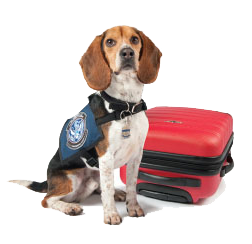International Traveler: Plants, Plant Parts, Cut Flowers, and Seeds
[ Back ]
The United States restricts or prohibits the entry of many agricultural products, which can carry foreign pests and diseases that harm American agriculture and our environment. A major pest or disease outbreak could mean higher grocery bills, shortages of certain foods, and devastating losses for our farmers and ranchers. Help us keep American agriculture healthy by following the guidance on this page about products you may want to bring into the United States.

Are you traveling from Canada by Land? Find out which meat, poultry and pet food products that you CAN and CANNOT bring back to the U.S. from Canada's land border. Air travelers should refer to the guidance listed below.
Plants and Seeds that you CAN and CANNOT bring back to the U.S. from other countries (choose below)
- General Guidance
Many plants, plant parts and seeds from foreign countries may enter the United States provided they meet certain requirements to prevent the introduction of plant pests and diseases. These requirements vary depending on the type of plant, whether you are bringing the whole plant or just parts of the plant, the country of origin, and its intended use. Travelers should plan ahead because you may need to obtain a permit or other official documents, which can take up to 30 business days to process. To determine the specific requirements for your situation, please contact APHIS’ Plant Import Information Line at 877-770-5990 (toll-free) or by email at plantproducts.permits@aphis.usda.gov
- Plants and Plant Parts for Growing (Nursery Stock, Roots, Bulbs, etc.)
-
Plants in soil are prohibited.
Travelers may bring 12 or fewer bare-rooted plants (no soil, sand, earth, or other growing media) if they meet the following conditions:
- The plants are not otherwise prohibited, protected under the Endangered Species Act or Convention on International Trade in Endangered Species of Wild Fauna and Flora, or subject to any special restrictions, such as post-entry quarantine or treatment
- You have a phytosanitary certificate issued by the National Plant Protection Organization of the country you are leaving indicating the plants are free of pests and diseases
- U.S. Customs and Border Protection inspects the plants at the first port of entry and determines they are free of pests and diseases and meet all entry requirements
Travelers may wrap plants in damp newspaper or similar material to prevent them from drying out. Roots may be secured in a plastic bag.
Travelers who want to bring 13 or more plants must obtain an import permit from APHIS and mail or ship the plants directly to the nearest USDA Plant Inspection Station. You may not hand carry 13 or more plants into the country. All costs to move or treat the plants (should USDA detect any pests or diseases) will be at the expense of the importer.
Please call APHIS’ Plant Import Information Line at 877-770-5990 (toll-free) or by email at plantproducts.permits@aphis.usda.gov
- Seeds
-
Seeds from trees and shrubs are prohibited in passenger baggage.
Travelers may bring seeds of admissible herbaceous plants for planting if they meet the following conditions:
- The seeds are not otherwise prohibited, protected under the Endangered Species Act or Convention on International Trade in Endangered Species of Wild Fauna and Flora, or subject to any special restrictions, such as post-entry quarantine or treatment*
- You have a phytosanitary certificate issued by the National Plant Protection Organization of the country you are leaving indicating the seeds are free of pests and diseases
- U.S. Customs and Border Protection inspects the seeds at the first port of entry and determines they are free of pests and diseases and meet all entry requirements
*Please call APHIS’ Plant Import Information Line at 877-770-5990 (toll-free) or by email at plantproducts.permits@aphis.usda.gov
- Fresh Cut Flowers and Greenery
-
Fresh cut flowers and greenery must be presented to U.S. Customs and Border Protection (CBP) at the first port of entry for inspection. If the CBP agricultural specialist or officer finds harmful plant pests or diseases on your cut flowers or greenery or determines that the items do not meet entry requirements, they may refuse entry. Some cut flowers and greenery may have to meet additional requirements for entry into the United States if they are edible, may be planted and grown, or if they are from endangered or protected plant species. For more information, please contact APHIS’ Plant Import Information Line at 877-770-5990 (toll-free) or by email at plantproducts.permits@aphis.usda.gov
- Still Have Questions?
-
Use the Veterinary Services (VS) Permitting Assistant to understand import requirements for animal products. This self-guided tool has the most updated and comprehensive information, based on the type of materials you want to bring in and the intended use. Please note that commodities intended for "personal use" mean those in passenger baggage or passenger vehicles. Commodities sent by mail are regulated as "commercial" use.
How Do I Declare Agricultural Items?

USDA-trained dogs help sniff out plants and animal products in luggage and carry-on items on international flights. Make sure you include any agricultural items on your Customs Declaration Form (select form below). This form provides Customs and Border Protection officials with basic information about who you are and what you are bringing into the United States, such as agricultural and wildlife products and whether you have visited a farm prior to traveling to the United States. When you declare, a U.S. Customs and Border Protection official can check your items. This is the only way to be certain that your items are free of plant pests and animal diseases.
Customs and Border Protection (CBP) Forms